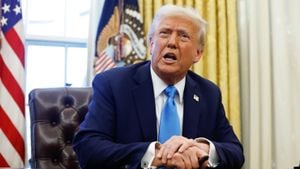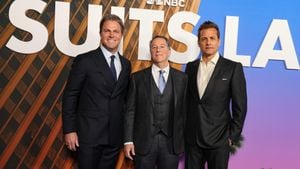On the latest episode of Last Week Tonight, John Oliver pulled no punches as he took aim at Elon Musk and the recently formed Department of Government Efficiency. Oliver's critique drew immediate parallels to the disastrous Willy Wonka immersive experience, which has become infamous as one of the most significant event mishaps since the Fyre Festival.
Starting the episode with trademark bravado, Oliver lambasted the newly contracted organization, criticizing its leadership, especially Musk, who he said seemed to have had “no idea what they’re doing.” His sharp remarks were fueled by Musk's misguided assertion of $55 billion saved through haphazard federal spending cuts. ``According to NPR,” Oliver noted, “the actual savings were much closer to $2 billion, which is quite a bit less and, frankly, pretty far off from the original figure.” This major discrepancy drew laughter from the audience and showcased Oliver's ability to blend humor with pointed critique.
Displaying a captivating image of the dismal Glasgow Wonka Experience—a failed attempt at creating enchantment through immersive entertainment—Oliver quipped, “Right now, we are all her,” referring to the downtrodden character from the promotional material, which took the internet by storm when it first appeared. His commentary struck chords with viewers, effectively linking the disconnected nature of Musk’s claims with the ill-fated experiential event.
Oliver didn’t stop at financial accuracy, also ridiculing Musk’s bizarre chainsaw display at the Conservative Political Action Conference (CPAC). During the event, Musk celebrated the reputation of DOGE (Dogecoin) and its controversial impacts on government jobs by brandishing the power tool on stage. Oliver remarked slyly, “I’m not legally allowed to say what I want to happen there, but I can and am thinking it really hard right now.” This playful banter highlighted both the absurdity of the display and the seriousness of the underlying issues.
“But,” he continued, “a chainsaw might actually be a pretty apt metaphor for DOGE, seeing as Musk’s cutting appears to be hasty and done without much precision.” This tongue-in-cheek commentary highlighted the tightrope the government now walks as it struggles to replace positions hastily eliminated under Musk’s reign. Just this Monday, reports began surfacing of the government’s urgent need to hire more than 300 employees dedicated to managing America's nuclear weapons, creating stark imagery of the consequences of Musk's reckless cuts.
Notably, shortly after Musk’s chainsaw theatrics, the U.S. Department of Agriculture (USDA) issued statements of their own, inadvertently recalling staff who were tasked with handling government responses to the avian flu outbreak. Oliver seized on these errors to underline the broader impacts of such leadership, noting the very real dangers posed by improperly managed personnel reductions.
Audiences found themselves chuckling at the absurdity of the connections Oliver made between reality and performance art—even if they may not have necessarily been laughing at the seriousness of those connections. Oliver’s sharp wit and willingness to confront big personalities like Musk allowed him to present complex and concerning issues related to government efficiency, employment, and fiscal mismanagement without his viewers feeling weighed down by despair.
This combination of humor and critique serves not only to entertain viewers but also to provoke thought about the repercussions of what may happen if such high-stakes positions are not properly managed. Musk’s chaotic management of the Department of Government Efficiency, highlighted through Oliver’s insightful commentary, raises pressing questions about competency and accountability at the highest levels of government.
So, whether it’s 55 billion or 2 billion, humor remains Oliver’s weapon of choice as he navigates these baffling terrains—showing once more why satire is one of the most powerful tools to dissect the interface of politics, governance, and pop culture.



